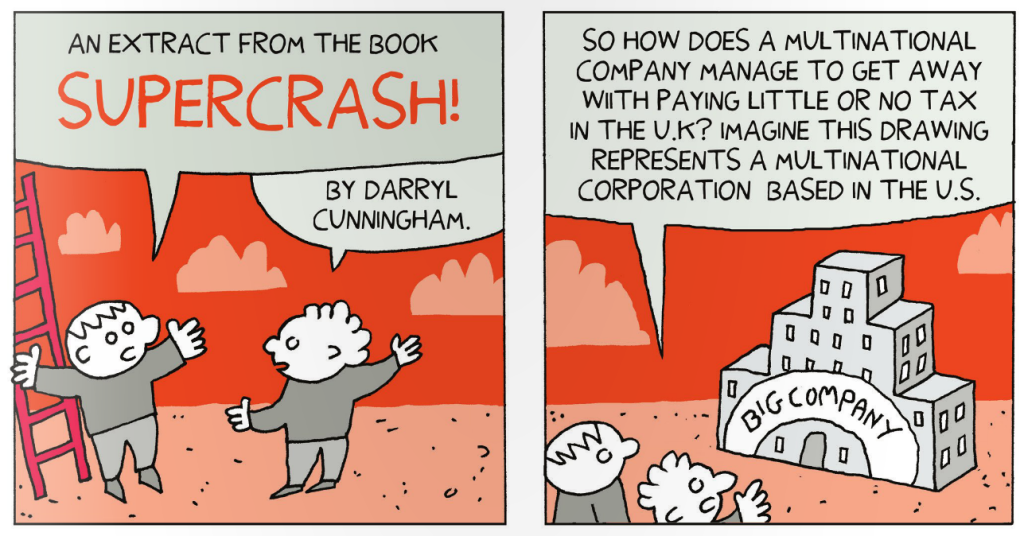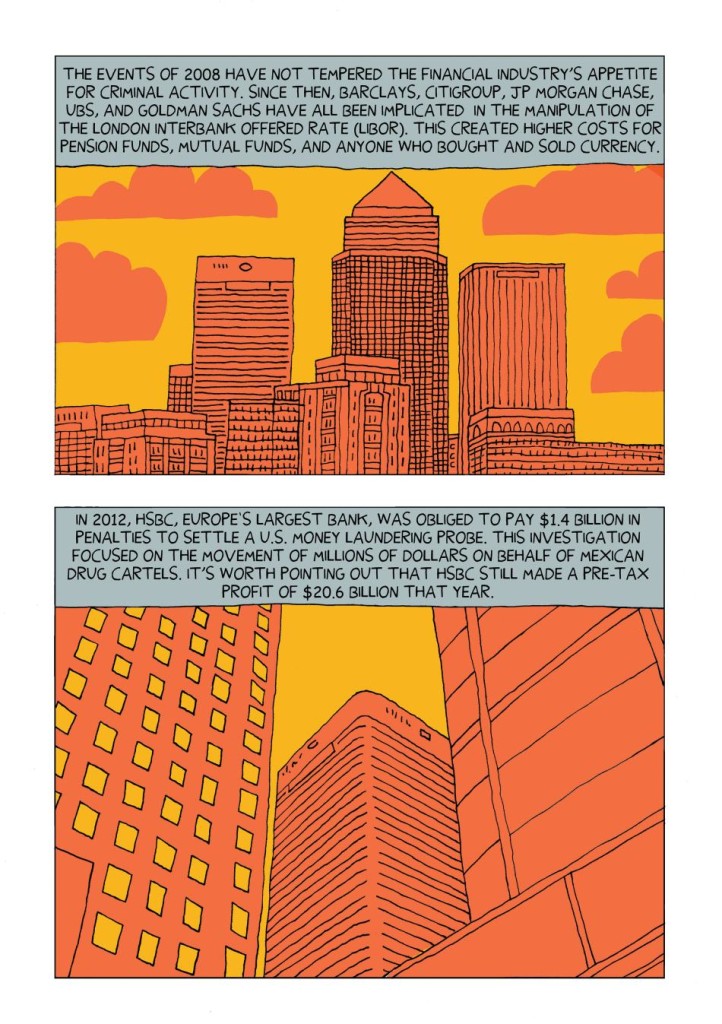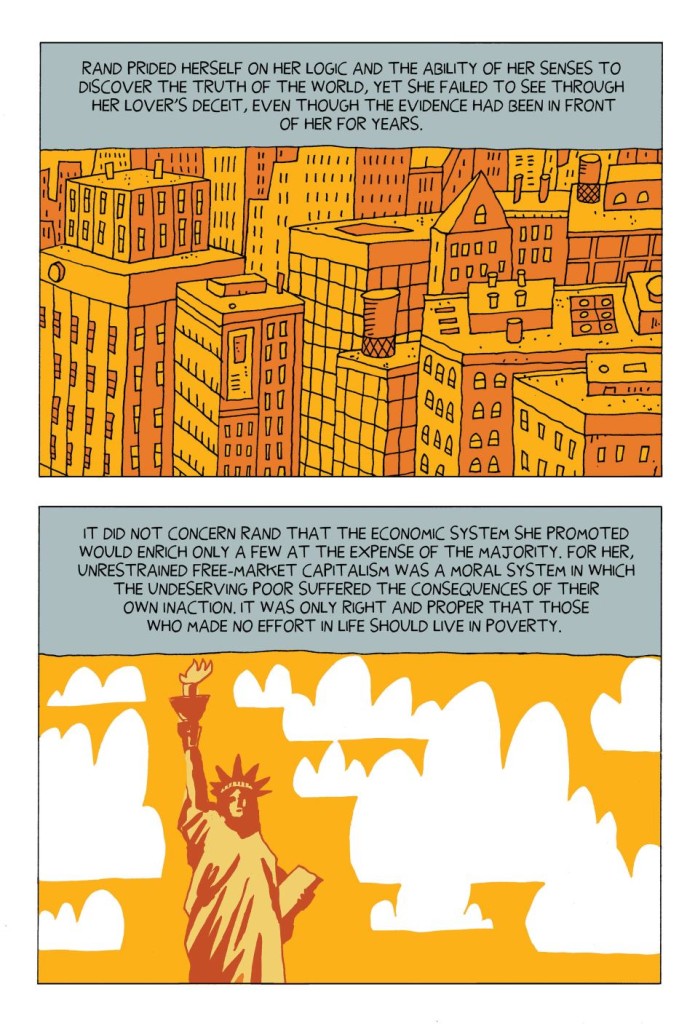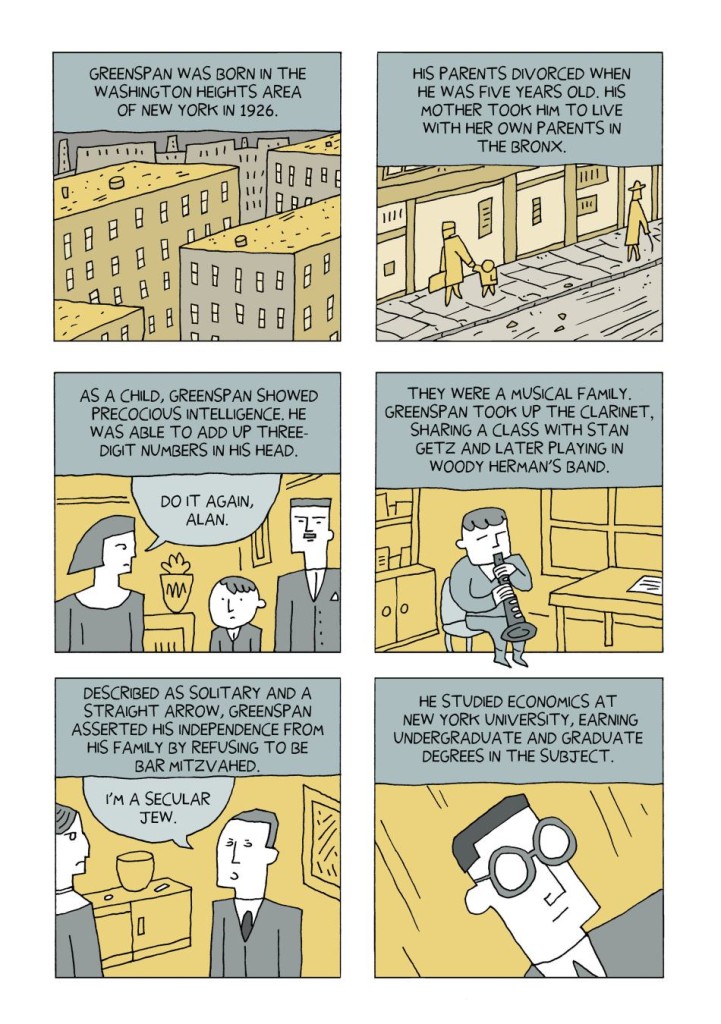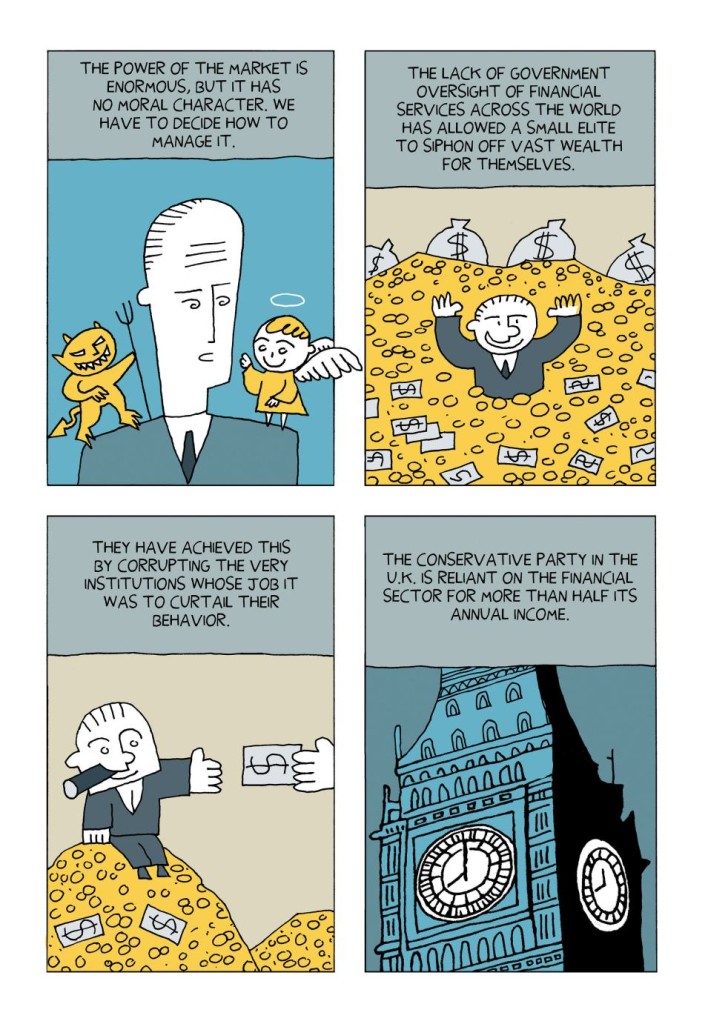Last year I chatted to Darryl Cunningham about his graphic novel, Supercrash: How to Hijack the Global Economy. That book, released in October 2014, tells the story of the recent global financial crisis.
My conversation with Darryl was edited into a 500-word interview that subsequently appeared in the Big Issue in the North. Anyway, I thought it would be a good idea to present the full, unedited transcript of my chat with Darryl in case it is of interest to those who follow his work (and to those who are not yet familiar with what he does). Joe Gordon of Forbidden Planet International and John Freeman of downthetubes have both kindly agreed to host the resulting transcript.
(Read the Forbidden Planet International version of this interview here)
My thanks to John, Joe and Darryl for their help in getting this interview out to a wider audience. I’m also grateful to the Big Issue in the North who have published various comics-related articles that I’ve written and are a fun magazine to work for.
Matt: Why have you gone for a comic strip format to tell Supercrash: How to Hijack the Global Economy?
Darryl Cunningham: I draw and write, so it seems natural to me to do it that way. To me, it’s such an easy way of presenting information. There’s a clarity about it as much as anything else. I personally enjoy comic strips very much and they are very good at presenting masses of information very quickly and succinctly.
Matt: I imagine that visual images can hook information in people’s minds so that’s another reason for using the comic strip format, which is, of course, strongly visual.
Darryl Cunningham: I think so, yes.
Matt: The first part of the book is a biography of Ayn Rand. Why did you include that?
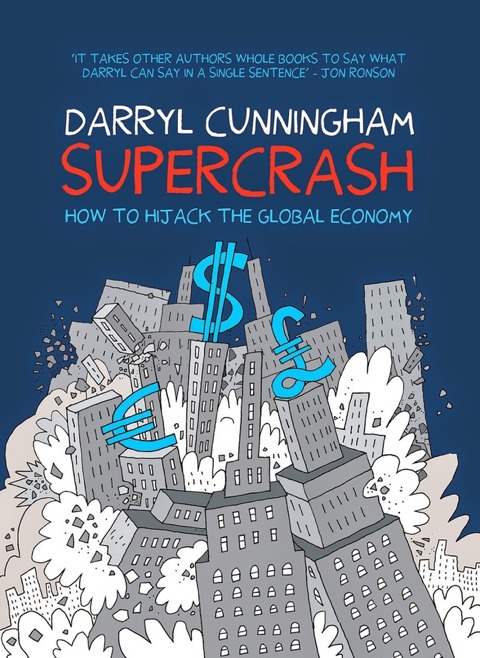 Darryl Cunningham: That was my way of trying to understand the very right-wing mind-set that has brought about the world we live in. We’ve been living in an ultra-capitalist, free-market world for the last 30 years. [Philosopher, novelist and screenwriter] Ayn Rand played a big part in developing that mind-set in the 1940s and 1950s. I discuss the philosophy she espoused as well as its many drawbacks, both from a personal point of view, in the effect that philosophy had on her own life, and in a larger context for society. Rand had a strong influence on some people who went on to have very high office.
Darryl Cunningham: That was my way of trying to understand the very right-wing mind-set that has brought about the world we live in. We’ve been living in an ultra-capitalist, free-market world for the last 30 years. [Philosopher, novelist and screenwriter] Ayn Rand played a big part in developing that mind-set in the 1940s and 1950s. I discuss the philosophy she espoused as well as its many drawbacks, both from a personal point of view, in the effect that philosophy had on her own life, and in a larger context for society. Rand had a strong influence on some people who went on to have very high office.
Matt: People who went on to be a significant part of the United States government?
Darryl Cunningham: Yes. In particular, we’re talking about Alan Greenspan who was Head of the Federal Reserve in the US. That’s sort of equivalent to being head of the Bank of England here. He was in Rand’s inner circle in the 1950s. He basically took her philosophy and put it into practice. He was Head of the Reserve for 30 years, from Reagan right up until Bush the younger. A lot of his overview of the banking and financial sector meant basically not regulating it. Regulation was best left to the private sector itself rather than the government. Government was seen as bad. Any kind of regulation was seen as bad.
Matt: I suppose you could describe what you’re doing as documentary comics. Do you strive to be objective?
Darryl Cunningham: I’m not trying to get a balance of opinion in my work. I’m trying to get at the truth. And the truth is generally quite ugly when it comes to what happened in the financial crisis. So, it does come down very heavily as anti-right wing but that’s the nature of trying to describe what happened.
Matt: You use the word truth, so it does sound like you’re striving for a level of forensic analysis rather than simply presenting your opinions on the page.
Darryl Cunningham: Yes. I think so. I think that’s fair.
Matt: Canadian activist Naomi Klein has said she views free-market ideology as a cover story for greed. What do you think?
Darryl Cunningham: Well, it is. And the thing is that Ayn Rand wouldn’t argue with that. She was happy with greed. She thought that selfishness was in fact a prime virtue and it was misunderstood as a motive for human beings. Altruism she took a very dim view of and thought it was very destructive. She thought it was being used by government to steal people’s money, through taxation and things like that.
So, if you are really the kind of person who wants to tread on other people and is very selfish, then Rand’s philosophy of Objectivism is a very convenient one. That’s basically what she did. She was a selfish person. She spent her whole life then looking for a philosophical justification for it and she came up with one.
But it’s an absolute nonsense, really. You can easily pick it apart. It’s very destructive. Not just individually, as in her own personal life, but for everyone. Selfishness does have a place but you need to balance it with altruism as well.
Matt: Do you think that the actions the bankers took that in part led to the financial crisis were irrational? Do you think that they actually tipped into a kind of insanity?
Darryl Cunningham: No. I think their behaviour was in the boundaries of normality, although it was quite extreme. I think we should be looking at society as a whole. It’s pitched to the right politically and I do make a point in the book that it’s not entirely a ‘bashing the right’ thing. The right has its own uses.
The right brings with it a natural tendency to keep the status quo and to bring stability to society in times that might otherwise be chaotic. Liberals tend to bring change and innovation but you can’t have too much of that because you bring chaos. So, what you want is a balance of the two – stability versus innovation and change, both technologically and in society.
At the moment we’re living where things are pitched too far one way. We’ve got quite a lot of technological innovation but we’ve also got a tendency to look backwards and, in some cases, unpick some of the things that have been achieved by people in the past and the gains of the 1960s and 70s. We’ve seen the diminution of the unions. In fact, the unions have been demonised.
Matt: Are you optimistic or pessimistic about the future generally?
Darryl Cunningham: I’m always optimistic. We’ve got into situations like this before and we’ve won. We’ve had very rich families who have monopolised wealth and prosperity. Then we’ve had politicians who came along and broke those monopolies, as well as the rise of union power. These problems can be solved even when that seems impossible.
Matt: Have you heard about the protests that are going on in the United States? Lots of fast food workers and people who work for places like Wal-Mart, who own ASDA here, are protesting to get something approaching a living wage.
Darryl Cunningham: The Wal-Mart family are the richest in the world and their workers barely have a living wage. Their stores have collection points so people can leave money for their workers. The state subsidises their workers [by topping up their wages with welfare payments].
It’s economically disastrous to have people without any spending power because without spending power from the majority of people you won’t have any growth in the economy. There’s nothing there. You can’t just depend on rich people to spend their money because they don’t. They hoard it away.
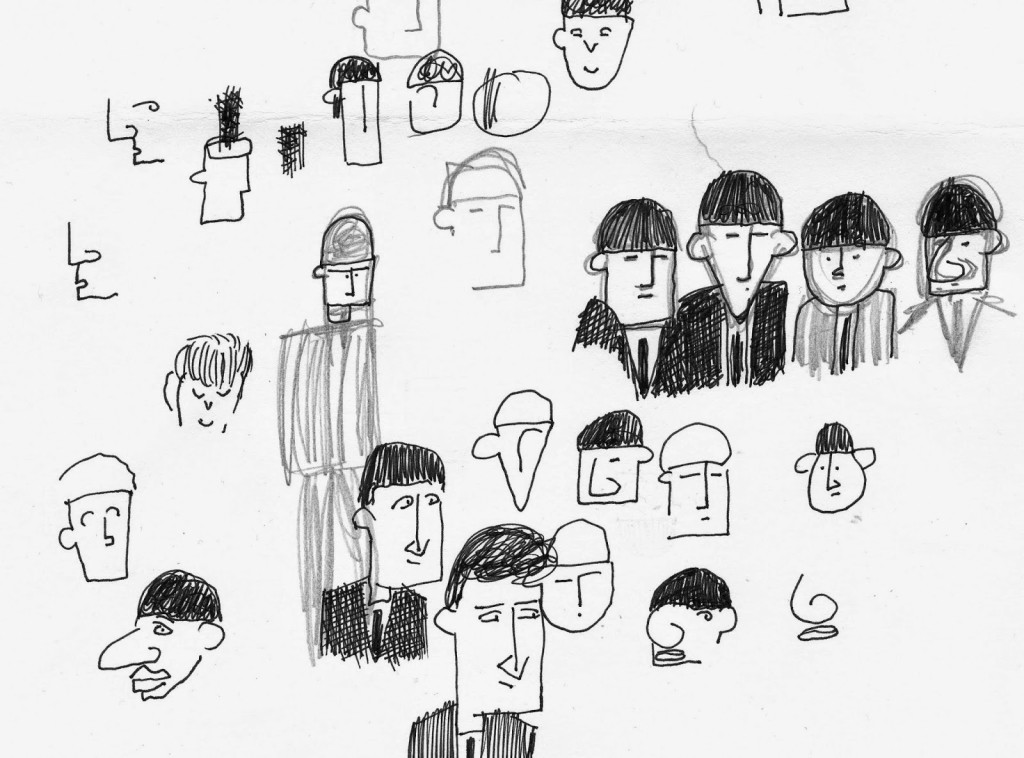
Darryl’s “Beatles Scribbles”, part of his prep for his next project, which will be a collaboration with two other cartoonists.
Matt: What are you going to be doing next comics-wise? Do you know?
Darryl Cunningham: I’m just waiting to see. I might do some fiction work. I’ll probably do a series of shorter works until I get a sense of what my next big subject will be. I have to feel very committed to a subject to spend two to three years working on a book.
Matt: Where can people find your work online?
Darryl Cunningham: I’m at http://darryl-cunningham.blogspot.co.uk
Matt: You post a lot of your stuff online, don’t you? Some of it is finished and some is still a work in progress.
Darryl Cunningham: I have a tendency to show stuff online first just to get a sense of it. And when it’s factual work, I benefit from people who have knowledge about the subject coming along and commenting on it. They read it and point out factual errors to me.
Matt: Darryl Cunningham, thanks for your time.
• Supercrash: How to Hijack the Global Economy is available through all good bookshops, physical and digital, now. Here’s some sample pages…
• Read the Forbidden Planet International version of this interview here
Matt Badham is a freelance writer. His work has appeared in the Judge Dredd Megazine, 2000AD and Big Issue in the North.
Categories: British Comics, British Comics - Books, British Comics - Graphic Novels, Comic Creator Interviews, Comic Creator Spotlight, Creating Comics, Featured News, Features

